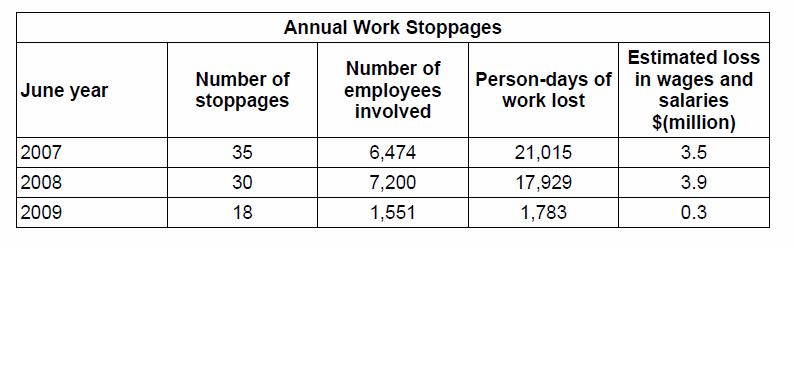The following article by Mike Kay overviews industrial activity in New Zealand in 2009 and summarises some of the highlights.
Overview
The Statistics NZ Survey of Working Life (March 2008) identified 30.1% of all employees as union members. Female employees were more likely to be union members than males (33.0% and 27.4%, respectively). Only 17.4% of casual employees were unionised. By industry, union membership was highest for those who worked in education (58.5%), health and community services (52.0%) and other services (42.8 %). Professionals (46.1%) and those who worked as plant and machine operators and assemblers in their main job (41.5%) had the highest level of union membership.
There has been a strong downward trend for work stoppages in the recent period, by every measure:
 Source: Statistics NZ Work Stoppages: June 2009 quarter
Source: Statistics NZ Work Stoppages: June 2009 quarter
Although the year to June figures excludes a number of recent major disputes towards the end of 2009, they represent the lowest number of stoppages in 18 years. The transport, postal and warehousing industry was responsible for most stoppages, significantly ahead of the next most militant sector, manufacturing. Undeniably, we are still in the midst of a protracted downturn in the class struggle, although some notable exceptions to the trend may point the way to a revival of militancy in the coming year.
Internationally, combativity has been most pronounced where the global recession has bit the hardest. The Spark has highlighted some of the exemplary instances of resistance, such as the occupations of Vestas wind turbines and Ford’s Visteon plants in the UK, SsangYong motors in Korea and Waterford Crystal and Thomas Cook in Ireland. Nevertheless, these have remained isolated pockets of militancy.
Highlights
A number of disputes this year were provoked or exacerbated by employer belligerence. The telephone line engineers’ dispute was caused by Telecom bringing in an aggressive new contractor Visionstream in the Auckland and Northland regions. The deal offered to the engineers as of 1 October was to sign up as an individual contractor, or be out of a job. The way the employment relationship was structured was to load all the costs and risks on the worker. The engineers union, the EPMU, had little option but to mount a large-scale public campaign. They picketed exchanges, and there was a big mobilisation at the Telecom AGM in Auckland.
The results of that struggle were not clear-cut, and are still emerging. The union appears to have secured an outright win in Northland, where solidarity was strongest. The workers there will continue to work on wages via a subcontractor. Elsewhere, it’s a mixed bag. A fair number have signed up as individual contractors, a few are still on wages, and others remain in limbo. A high-stakes battle like the Telecom dispute, which was about totally redefining the employment relationship, required more than business-as-usual trade unionism. In retrospect, the decision of the EPMU to keep picketers penned behind the cordon at the AGM picket instead of trying something more daring was a wasted opportunity.
The increasingly confrontational approach of employers was in evidence with several high-profile lockouts. Dairy workers at Open Country Cheese in the Waikato fought a bitter lockout imposed by their anti-union employer in response to the workers’ demands for a Collective Employment Agreement (CEA). The parties reached a deal at mediation on 24 October, which included a CEA. The intensity of this struggle by a relatively small group of workers (around 35) will have been a wake-up call to the Dairy Workers Union who previously relied on “partnership” approaches to industrial relations.
The week-long lockout of Auckland bus drivers drew widespread public support for the workers, as well as backing from the Auckland Regional Council. Unfortunately, the drivers were plagued by division amongst the three main unions involved. After the lockout was lifted, the employer presented an offer of an 11.5% pay increase over three years, which was rejected by a narrow margin at a mass stopwork meeting on 4 November. However, a further stopwork meeting three weeks later overwhelmingly voted to accept substantially the same offer (with a few less management claw-backs.)
Political Situation
While some unionists were predicting that the new National-led government would herald a re-run of the devastating Employment Contracts Act of the 1990s, the behaviour of the leadership of the union movement in practice has revealed that they regard the new government as not all that different from their predecessors under Helen Clarke. Unions bought into John Key’s self-publicising “Jobs Summit”, and Key scored a further propaganda victory when addressing the Council of Trade Unions conference as keynote speaker.
The government’s sop to employers, the 90 day “Fire at Will” law, whilst repugnant, has not significantly shifted the balance of power in the workplace. Key has been keen to distance himself from the neo-liberal fundamentalists, who have little to offer the ruling class in the current period of capitalist crisis.
The Workers Party has maintained that the union movement will not succeed in defeating the current enemy if it remains obsessed with fighting the enemy of yesteryear. Key’s approach is not for a full-scale confrontation with organised labour, but rather seeks the incorporation of elements of it in order to help run the capitalist system more efficiently. It is far more insidious than the “slash-and-burn” approach of the 1990s, and needs to be countered by an explicitly class-struggle based politics.
As is usual under National, union bureaucrats are far more willing to criticise the government. We have seen this over privatisation of prisons, the government pay freeze and attacks on ACC. There is a real danger that this one-sided “anti-Toryism” may result in some of the non-aligned unions (such as NDU and AWUNZ) sleepwalking back into the default position of supporting Labour, for lack of a political alternative. Revolutionaries need to start discussing with workers about building a fighting union movement that will stand up to all pro-capitalist governments of whatever hue.
